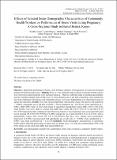| dc.contributor.author | Crispin, Ndedda | |
| dc.contributor.author | Wamae, Annah | |
| dc.contributor.author | Ndirangu, Meshack | |
| dc.contributor.author | Wamalwa, David | |
| dc.contributor.author | Wangalwa, Gilbert | |
| dc.contributor.author | Watako, Patrick | |
| dc.contributor.author | Mbiti, Elijah | |
| dc.date.accessioned | 2021-08-31T11:55:04Z | |
| dc.date.available | 2021-08-31T11:55:04Z | |
| dc.date.issued | 7/26/2012 | |
| dc.identifier.citation | Crispin, Ndedda et al. “Effects of selected socio-demographic characteristics of community health workers on performance of home visits during pregnancy: a cross-sectional study in Busia District, Kenya.” Global journal of health science vol. 4,5 78-90. 26 Jul. 2012, doi:10.5539/gjhs.v4n5p78 | en_US |
| dc.identifier.issn | 1916-9736 | |
| dc.identifier.uri | http://repository.amref.org/handle/123456789/187 | |
| dc.description.abstract | Objective: Appropriate performance of home visits facilitates adoption of best practices at home and increased
demand for facility based services. Methods: It was a cross-sectional study in which community health workers
were observed conducting home visits during pregnancy. Data was collected using a structured questionnaire
and the Consultant Quality Index (CQI-2 tool) on record keeping, use of job aids, counselling, client satisfaction
and client enablement. Descriptive and inferential statistics were used. Relationships were determined using chi
square and odds ratios. Results: The study showed significant relationships of age with good record keeping (p
= 0.0001), appropriate use of job aids (p=0.0001), client satisfaction (p = 0.018) and client enablement (p =
0.001). Male CHWs were 1.6 times more likely to keep better records than females (OR 1.64 CI (1.02-2.63),
while females were more likely to counsel and enable their clients OR 0.42 CI (0.25-0.71) and OR 0.29 CI
(012-070) respectively when compared to men. Moreover, higher levels of education were associated with good
record keeping OR 0.30 CI (0.19-0.49), p=0.0001; appropriate use of job aids OR 0.30 CI (0.15-0.61) and to
appropriately counsel their clients OR 0.34 CI (0.20-0.58) than their lower literacy level counterparts.
Experience of CHWs was associated with appropriate use of job aids (p = 0.049); client satisfaction (p =
0.0001) and client enablement (p = 0.032). Conclusions: Socio-demographic characteristics of community
health workers affect the performance of home visits in various ways. The study also confirmed that CHWs with
lower literacy levels satisfy and enable their clients effectively. | en_US |
| dc.description.sponsorship | AMREF, Kenya Country Office, USAID, | en_US |
| dc.language.iso | en | en_US |
| dc.publisher | Canadian Center of Science and Education | en_US |
| dc.subject | Socio-demographic characteristics | en_US |
| dc.subject | Performance | en_US |
| dc.subject | Home visits | en_US |
| dc.subject | Pregnancy | en_US |
| dc.subject | Community health workers (CHWs) | en_US |
| dc.title | Effects of Selected Socio-Demographic Characteristics of Community Health Workers on Performance of Home Visits during Pregnancy: A Cross-Sectional Study in Busia District, Kenya | en_US |
| dc.type | Article, Journal | en_US |

